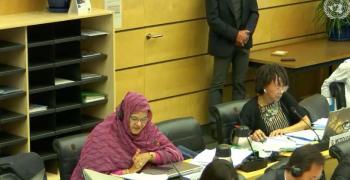UHRP condemns the Chinese UN delegation’s stonewalling in the face of abundant evidence of its ‘re-education’ camps holding a million Uyghurs

For immediate release
August 14, 2018 11:05 am EST
Contact: Uyghur Human Rights Project +1 (202) 478 1920
The just-concluded United Nations review of China’s implementation of the Convention on the Elimination of All Forms of Racial Discrimination (CERD) has demonstrated that it is increasingly difficult for the Chinese government to deflect international attention to its ongoing human rights violations against Uyghurs. The Uyghur Human Rights Project (UHRP) condemns its continued attempts, in the face of abundant evidence, to conceal the extent of the repression.
While the Chinese government has violated the Convention on the Elimination of All Forms of Racial Discrimination for decades, excluding Uyghurs from the benefits of the natural resources and economic development of their homeland, preventing equitable political representation, and trampling over cultural and linguistic rights, the current level of repression is unprecedented in the post-Mao era. Multiple independent investigators have documented the large-scale system of extra-judicial internment camps, holding as many as a million Uyghurs and members of other ethnic groups. Painstaking research has established that as many as two million others are forced to attend day or evening “education sessions” for “de-radicalization” and indoctrination purposes.
This evidence also includes the large numbers of official tenders for the construction of the camps, corroboration of the existence with satellite imagery, and the disappearances of numerous prominent Uyghurs, including scholars, businessmen and celebrities. Dozens of interviews with individuals who have managed to reach safety after being interned reveal widespread inhumane treatment inside the detention centers.
Official Chinese government websites have announced the establishment of “De-extremification Re-education Centers” (“去极端化”教育培训中心), published photographs, and quoted high-level regional officials discussing the implementation of a re-education program. Without addressing this evidence, the Chinese delegation in Geneva flatly denied their existence, saying “there are not such things as ‘re-education centers‘ or ‘counter-extremism training’ centers” in Xinjiang.” Instead, they claimed, “criminals involved only in minor offences” are assigned to “vocational educational and employment training centers to acquire employment skills and legal knowledge with a view to assisting in their rehabilitation and reintegration.” They did not, however, deny the existence of the practice of holding people for “education,” saying “those deceived by religious extremism … shall be assisted by resettlement and education,” a practice which does not appear to meet the standards of China’s own laws.
It appears that China’s main tactic for obscuring its centers for indefinite extralegal detention is now to conflate “vocational education centers” for “those convicted of minor offenses” with the “de-extremification re-education centers.” Previous references to the vocational education program, which exists in both “closed” and “open” form, did not portray it as a program for “criminals,” but instead as facilities for unemployed youth and “surplus rural labor.” However, these facilities appear to have been folded into the ‘de-extremification’ program, holding people without criminal charges for indefinite periods of time. Among the government bids analyzed by scholar Adrian Zenz is one describing a “vocational school” as functioning as a “transformation through education base.”
An August 12 editorial in the state-run Global Times accuses Western countries of lying in order to destabilize the region, ending with the sinister conclusion that “all measures can be tried” in pursuit of the government’s goal of “peace and stability.”
“The Chinese government is signaling that no amount of suffering of Uyghurs and other Muslim minorities is too high a price to pay for ‘stability,'” said UHRP director Omer Kanat. “These policies of brutal repression do not represent stability for millions of innocent citizens of China who have had their families broken up, their spouses and parents locked away, their children sent to orphanages, their businesses shuttered and livelihoods destroyed. Everyone else lives in fear that they could be next.”
The international community must not accept the Chinese government’s attempt to evade responsibility, and must continue to demand answers about the program. The Committee on the Elimination of Racial Discrimination had strong words for the Chinese delegation. Vice-chair Gay McDougall expressed the committee’s concerns about reports of the internment camps, saying that the Xinjiang Uyghur Autonomous Region appears to have been transformed into a “no-rights zone,” where Uyghurs and other Muslims “are being treated as enemies of the state based solely on their ethno-religious identity.” She stated that more than simple denial was necessary to counter the evidence of the camps.
UHRP applauds the Vice-chair’s firm statement of the facts of the situation, and calls on national governments to condemn the Chinese government’s ongoing extreme violations of human rights. China’s response to the UN Committee this week has entirely failed to assuage concerns about the human rights emergency in East Turkestan.
